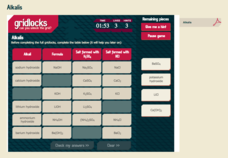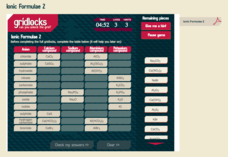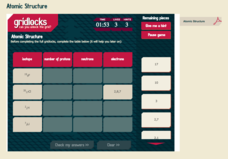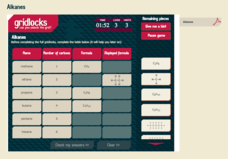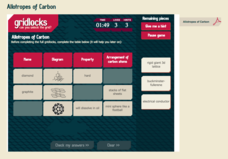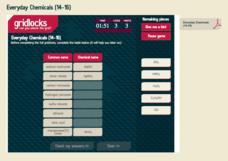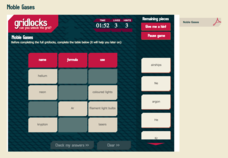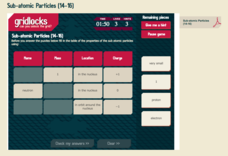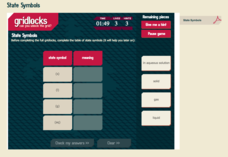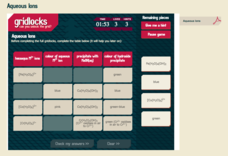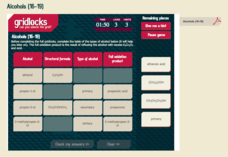Royal Society of Chemistry
Alkalis
Because they are reactive with air and water, scientists store alkalis in oil. Scholars complete a series of four puzzles reviewing information about alkalis. They match the alkali to its formula, the salt formed with H2SO4, and the salt...
Royal Society of Chemistry
Crude Oil
The United States consumes more oil than any other country, and its residents use 50 percent of that for transportation. Scholars match eight fractions of crude oil to their applications. Then, they fill in three logic puzzles reviewing...
Royal Society of Chemistry
Ionic Formulae 2
Scientists call ions with a negative charge anions. Scholars work through one matching puzzle and four logic puzzles reviewing the chemical formulas for anion ions. Each level increases in difficulty and solidifies the concept in pupils'...
Royal Society of Chemistry
Forensic Tests
Flame tests determine if there is a specific metal in a chemical compound. Young forensic scientists review their understanding of flame tests and hydroxide precipitates by solving puzzles. The timed review encourages mastery.
Royal Society of Chemistry
Hydroxide Precipitates
When two liquids combine and a solid forms, the new substance is called a precipitate. Scholars test their knowledge of hydroxide precipitates and their properties. A series of four increasingly difficult puzzles challenge their logic...
Royal Society of Chemistry
Esters from Alcohols and Acids
Fats and oils often contain esters, which sometimes find their way into perfumes due to their pleasant smells. Scholars match the name of esters made from four different types of alcohol and four different types of carboxylic acids....
Royal Society of Chemistry
Oxide Types
Amphoteric compounds act as both an acid and a base. Scholars apply their knowledge of the four oxide types while completing four puzzles. They match a sample of each type of oxide with the corresponding reaction.
Royal Society of Chemistry
Atomic Structure
Changing the number of neutrons in an atom makes it an isotope, but it does not change the element. Pupils complete logic puzzles, matching isotopes with their unique number of protons, neutrons, and electrons. Either on paper or timed...
Royal Society of Chemistry
Alkanes
Alkanes contain only single bonds and have no functional groups. Scholars match the properties of six alkanes in a series of four puzzles. Problem solving and logic help cement the concepts with repetition.
Royal Society of Chemistry
Allotropes of Carbon
Carbon takes on many forms including diamond, graphite, and buckminsterfullerene. Scholars review their knowledge of these three allotropes of carbon as they complete four puzzles. The first acts as a general review, and the other three...
Royal Society of Chemistry
Everyday Chemicals (14-16)
Two men want drinks and the first orders H2O. The second man orders H2O too, but he dies. Scholars apply their knowledge of H2O2 and other everyday chemicals during the activity. They match chemical formulas to common chemical names in a...
Royal Society of Chemistry
Flame Test Colours
Scientists identify elements by the color of flame they produce because each element is defined by exactly one line on the emission spectrum. By completing a series of puzzles, scholars reinforce their knowledge of the results of flame...
Royal Society of Chemistry
Pollutants in Air (14-16)
Polluted air contains more than 200 chemicals that age the skin, causing urban women to appear 10 percent older than their rural peers. An interesting interactive connects air pollutants and related data. Scholars work their way through...
Royal Society of Chemistry
Noble Gases
It is best to avoid jokes about noble gases; they get no reaction. Scholars match the noble gases to their symbols and uses. Then they solve three gridlock puzzles reviewing the material while applying some simple logic.
Royal Society of Chemistry
Ionic Formulae 1
The ionic formula for banana would be BaNa2. Scholars work their way through four puzzles reviewing ionic formulas. Each puzzle requires scientific knowledge as well as logic and problem-solving skills.
Royal Society of Chemistry
Sub-Atomic Particles (14-16)
In 1897, J.J. Thomson discovered the electron, the first subatomic particle proven to exist. Scholars review their understanding of electrons, protons, and neutrons as they work through the puzzles. Each puzzle connects two or three...
Royal Society of Chemistry
Tests for Anions
The anode, the positive electrode, attracts negative charges, which is why we call negatively charged atoms anions. The interactive allows pupils to match six different anions to the associated properties when testing. Offering four...
Royal Society of Chemistry
State Symbols
When water is a solvent in a chemical equation, we consider it an aqueous solution. Scholars match the name of four states of matter to their proper symbol in a chemical equation. Four puzzles provide repetition to help pupils remember...
Royal Society of Chemistry
Born-Haber Cycle: NaCl
Max Born and Fritz Haber developed the Born-Haber cycle in 1916, which is used for measuring enthalpy that otherwise couldn't be measured. Young scientists solve four matching puzzles using their knowledge of the stages, standard...
Royal Society of Chemistry
Aqueous Ions
Lose an electron? You should keep an ion it! Scholars test their knowledge of aqueous ions while completing four puzzles. Each puzzle requires knowledge of the ion, the color of the ion, the precipitate, and the color of the precipitate.
Royal Society of Chemistry
Amines and Related Compounds
Scientists call a molecule that contains a nitrogen atom that behaves as a base an amine. Four puzzles, related to amines and similar compounds, challenge scholars to prove their knowledge. After passing each puzzle, the next increases...
Royal Society of Chemistry
Alcohols (16-19)
Propanol is a common alcohol used in hand sanitizers. The many forms and uses of alcohols fill an intriguing lesson. Scholars apply logic to match alcohols, chemical structural formulas, oxidation products, and more in a series of puzzles.
Royal Society of Chemistry
Units of Volume
Did you know in the UK a quart is smaller than in America? This explains why a standard unit of measure is necessary for volume. Young scientists learn the similarities and differences between five different units used to measure volume....
Royal Society of Chemistry
Types of Bonding
A covalent bond yells at an ionic bond, "Didn't anyone teach you to share?" Four matching puzzles allow pupils to review covalent, ionic, and metallic bonding. They apply logic and problem solving to complete gridlocks including the...
Other popular searches
- Organic Chemistry
- Chemistry Chemical Reactions
- Chemistry Periodic Table
- Chemistry Equations
- Chemistry of Life
- History of Chemistry
- Chemistry Lesson Plans
- Organic Chemistry Projects
- Food Chemistry
- Chemistry Current Events
- Chemistry of Soap
- Water Chemistry


